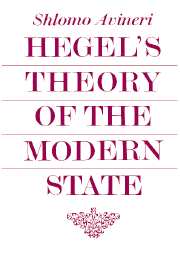Book contents
- Frontmatter
- Contents
- Title in the Series
- Preface
- 1 Beginnings
- 2 Positivity and Freedom
- 3 The Modernization of Germany
- 4 The New Era
- 5 Modern Life and Social Reality
- 6 The Owl of Minerva and the Critical Mind
- 7 The Political Economy of Modern Society
- 8 Social Classes, Representation and Pluralism
- 9 The State – the Consciousness of Freedom
- 10 War
- 11 The English Reform Bill – the Social Problem Again
- 12 History – the Progress towards the Consciousness of Freedom
- Epilogue
- Bibliography
- Index
2 - Positivity and Freedom
Published online by Cambridge University Press: 05 June 2012
- Frontmatter
- Contents
- Title in the Series
- Preface
- 1 Beginnings
- 2 Positivity and Freedom
- 3 The Modernization of Germany
- 4 The New Era
- 5 Modern Life and Social Reality
- 6 The Owl of Minerva and the Critical Mind
- 7 The Political Economy of Modern Society
- 8 Social Classes, Representation and Pluralism
- 9 The State – the Consciousness of Freedom
- 10 War
- 11 The English Reform Bill – the Social Problem Again
- 12 History – the Progress towards the Consciousness of Freedom
- Epilogue
- Bibliography
- Index
Summary
While Hegel's early fragments point to his concern and dissatisfaction with the traditional view of the state as a legitimate expression of self-interest, another preoccupation always accompanies his historical studies and exercises. This is the attempt to confront the problems raised by institutional religion. Rosenkranz, Hegel's biographer, points out that during his years in Berne, Hegel had emancipated himself from the orthodox theology which he had been taught at the Tübingen seminary. Yet this emancipation was not achieved through an outright repudiation of orthodoxy, nor through the adoption of a merely anti-religious or anti-clerical attitude. Hegel was led to confront some traditional theological problems with contemporary philosophical principles; and just as he moved away, during 1795–1800, from a Kantian position in philosophy, so his discourses on problems relating to religious issues came to reflect subtle changes in emphasis and typology, though the basic issues discussed remained broadly the same.
The manuscripts dealing with these problems were published for the first time by Hermann Nohl in 1907 under the title Hegels theologische Jugendschriften, and it is under a similar title that most, though not all of them, have been published in English. Nevertheless, despite the fact that most of these fragments deal with issues related in one way or another to religion, they are not theological writings in the strict sense of the word. Some of the fundamental theological problems involved are allowed to remain more or less open by Hegel when he admits a dichotomy between reason and revelation – and leaves it at that.
- Type
- Chapter
- Information
- Hegel's Theory of the Modern State , pp. 13 - 33Publisher: Cambridge University PressPrint publication year: 1972

